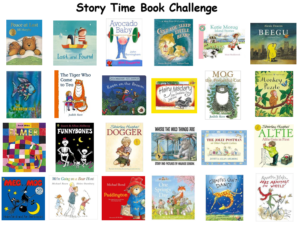English
Our aim for English is for all children to be confident speakers, listeners, readers and writers and to provide students with the opportunity to build upon their reading, writing and comprehension skills, including understanding a range of texts types and their purpose using both evaluative and analytical skills. We teach English using Talk 4 Writing, reading for pleasure, SPaG and Little Wandle.
1
‘Cold Write’ – what can I already write without any help?
2
WOW lesson – a hook to get children excited about the text topic
3
The imitation stage includes: learning the text aurally, learning to use the text map, discussing key vocabulary, hot-seating characters, ‘reading as a reader’ – comprehension questions about the text, ‘reading as a writer’ – creating a toolkit and highlighting the text, bespoke grammar lessons.
4
The innovation stage – looking at what changes we can make to the text we now know well. Editing the text map to make it our own. Writing that new text with support.
5
The invention stage or ‘Hot Write’ – what can I now write without any help and is it better than the ‘Cold Write’ I did at the start. Make a plan (own text map) and write independently.
Intent Overview:
At North Star 265° our English Curriculum aims to provide students with the opportunity to build upon their reading, writing and comprehension skills including understanding a range of texts types and their purpose, using both their evaluative and analytical skills. Our curriculum builds upon the skills and knowledge acquired at key stage two and introduces the key secondary assessment objectives broken down into developmental and age-related expectations.
All students will be exposed to a broad spectrum of texts including fiction and nonfiction which are designed to strengthen and embed key reading and writing skills. As well as, open up their minds imaginatively in order to develop reading for pleasure and their general writing ability. As students reach KS4 they follow a two-set pathway and work towards leaving school with an accredited certificate in English.
Our overarching aim at North Star 265° is to ensure that all students leave school being able to read, write and use clear oracy skills. Therefore, allowing them to function as an independent individual in society.
Intent statements:
- Develop reading skills including fluency, decoding, phonics and comprehension.
- Improve written ability through a vast range of genres. Including everyday functional language and text types.
- Develop clear speaking and listening skills through debate and presentational tasks.
- Allow all students to leave with an accredited certificate in English. Giving them the opportunity to follow a post 16 pathway appropriate to their needs.
- With Talk 4 Writing, children first learn a text aurally to develop a long-term memory of vocabulary and sentence structures. This supports their confidence to read and write independently. Children can work independently because they become very familiar with the words and structures they are using.
This process takes 2-3 weeks to complete so children will learn many texts over the year the range of texts covers fiction, non-fiction and poetry.
Working this way helps pupils become more confident when writing in other lessons.
Friday Free Write
Alongside the T4W English curriculum, all children across the school take part in a Friday Free Write to build confidence and motivation for extended writing. The lesson is not structures heavily and children are encouraged to write at length, without interruption.
Please click for more information on the Talk 4 Write Curriculum Progression
Why Talk 4 Writing at North Star 265?
The ‘Talk 4 Writing’ approach enables children to read and write independently for a variety of audiences and purposes within different text types and themes.
The Talk 4 Writing Curriculum at North Star 265 has been adapted to reflect the assessment objectives of the current secondary national curriculum for English, therefore topics are broken down to ensure there is a focus on the six key assessment objectives throughout the year within our T4W delivery. Due to the needs of our learners, there is a specific focus on the key writing and reading skills stemmed from the primary national curriculum and introducing our assessment objectives which are broken down into developmental stages from KS1 through to GCSE levels at KS4.
Spelling
In addition to Talk for Writing, we have introduced spelling practice for children who have completed phonics. We begin by focussing on Common Exception Words, then move on to other words within their spelling year group as required. Spellings are practiced at the beginning of every reading lesson.
Reading
We want every child to have a love of reading and books. Many children come to our school with a negative view of themselves as readers. We use high quality reading books at the right level for the child. Children read regularly in school and at home. This gives them the skills and confidence to make great progress.
Reading lessons include weekly ‘reading for pleasure’ sessions where children are encouraged to choose a book they might enjoy from a selection of books in the classroom. This encourages children to enjoy books freely, explore books that appeal to them and develop an independent love of reading.
Children are read high-quality texts daily by a member of staff. Staff are trained in pace, exploring vocabulary and generating a small amount of discussion around the book, as well as encouraging enjoyment of stories.
Reading is a key life-long skill. We teach children to be able to read a text out loud, e.g. to sound out the words and say them (phonics). We also teach them to understand the meaning of what they are reading (comprehension). Each child reads to an adult at least twice a week. Children identified as being in the lowest 20% for reading will read with an adult daily. We encourage the children to read at home with their parents and carers. Because we feel reading at home is so important, we award the pupils points for doing this. We check reading progress termly, with a standardised comprehension test in term 6.
We also encourage reading in other ways, including our reading raffle. For each entry from home into their reading record, children receive a raffle ticket which goes into our raffle box in each Friday assembly. At the end of each week the raffle is drawn and two children win a book of their choice. Each year we take part in World Book Day, when children are encouraged to dress up as their favourite character. The winner from each class wins a book voucher to use on a trip to Waterstones.
In terms 1 and 5, we use Star Reader to assess reading progress across the year. At the end of each term, we assess reading levels using ‘benchmarking’ for children who have completed Phonics.
SPaG (Spelling Punctuation and Grammar)
Children who have completed our Phonics programme move on to daily spelling and reading comprehension lessons. Children complete termly spelling tests in ‘Common Exception Words’ at first. Each Monday, children are given 5 weekly spellings specific to each child’s needs. They practice these throughout the week in time for a spelling test on Fridays where the children have the opportunity to mark their own 5-word test and monitor and take responsibility for their own progress.
Reading Comprehension
Along with encouraging comprehension through questioning when children read aloud to adults regularly, we also teach reading comprehension skills explicitly to children who have completed Phonics. We follow the Cracking Comprehension programme. This includes group sessions in which adults and children answer questions together about a text on the interactive whiteboard; individual supported sessions where children complete a similar, written comprehension assessment with help from the teacher; comprehension quizzes online which children can complete independently and check their answers; and termly reading assessments to support future teaching.
Reading comprehension is also taught through Talk 4 Writing, in which we discuss vocabulary and answer comprehension questions about our key texts. Story time sessions where adults read to children often incorporate comprehension check-ins from the adults to check the students are understanding what is happening in the story.
Annual formal assessments of comprehension take place regularly.
Reading for Pleasure
We want children to be able to talk about their favourite books and authors. In order to inspire the children, we have created reading book lists that classes have enjoyed reading through in their story time. Since the introduction of our first book list, children have been able to share their enjoyment and opinions about popular books and also make links between books by the same author.
Here is an example of our first book list, introduced last year:

Little Wandle Phonics
Sometimes children find it tricky to acquire the phonic skills to become a competent reader. At North Star 265° we use the Little Wandle Rapid Catch-up programme to help children gain the phonic knowledge they need as quickly as possible. Children with more complex needs access the Little Wandle SEN programme.
Children are taught in successive phases and we have plenty of independent reading books clearly matched to each phase. We also have a selection of phonics-level books aimed at older readers which we use to practice reading with the children within the phonics lessons.
Children who are identified for needing support through this programme are taught daily in small groups.
How is it delivered?
On entry to North Star 265˚, we assess whether a child is still in need of phonic lessons. If they are, we assess them using the school phonics assessment.
The Phonics Lead will then place the child in the correct phonics group. It is important that all children are working at their phonic level and learn the phonemes and red words in the correct order.
In KS1 phonics is delivered three times a week. There will be some movement between classes to ensure that children are being taught at the correct level, however this movement is kept to a minimum. At the end of every term, staff assess their phonics groups. The Phonics Lead then uses these assessments to make the necessary changes to the phonics groups for the following term.
Reading Books
In line with the latest OFSTED guidance, no child will have reading book containing sounds above their phonic knowledge.
Reading books for children accessing Little Wandle Phonics lessons
Children are assessed regularly according to the Little Wandle Assessment process. The outcome of these assessments gives a level of phonics book that the child can read independently. This is usually at a slightly lower level than the Phase they are working on. This is so that they can practice phonemes and graphemes that they already know. For example, if your child has recently started Phase 4 Phonics, they may be reading a book at level 3.1 or 3.2.
Phase 1
There is only 1 level in Phase 1. These are wordless books and marked with a white ‘1’ sticker.
Phase 2
There are 5 levels in phase 2. These go from 2.1 to 2.5 and are labelled with pink stickers and numbers.
Phase 3
There are 2 levels in Phase 3. These go from 3.1 to 3.2 and are labelled with blue stickers and numbers.
Phase 4
There are 2 levels in Phase 4. These go from 4.1 to 4.2 and are labelled with green stickers and numbers.
Phase 5
There are 5 levels in Phase 5. These go from 5.1 to 5.5 and are labelled with orange stickers and numbers.
After this, pupil’s reading level will be checked regularly and children will continue to move through banded reading levels.

